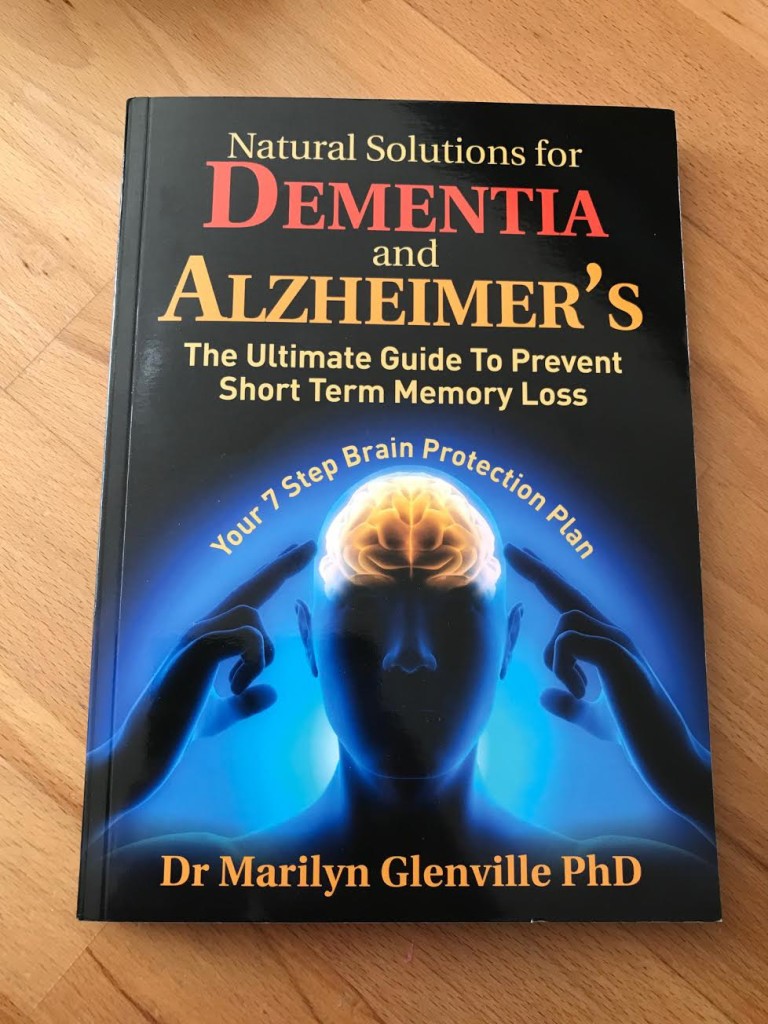
I have read a few books by Dr Marilyn Glenville, and we also feature her articles on Frost sometimes. She is a woman who really knows her stuff. I greatly enjoy her writing and her new book Natural Solutions for Dementia and Alzheimer’s, Your 7 Step Brain Protection Plan is one of her best books yet. Well-researched and never dull to read, it is brimming with information and advice. The book is thorough; part one helps you understand dementia and part two is your 7-step brain protection programme. From what to eat, your environment, training your brain, dealing with stress and exercise. This is an essential book in the fight against Dementia and Alzheimer’s.
New book launch from Dr Marilyn Glenville PhD
Following the huge success of bestselling Natural Alternatives to Sugar, Dr Glenville is adding to her literary portfolio this year with her brand new book Natural Solutions for Dementia and Alzheimer’s.
As it can take up to 10 years for dementia symptoms to show, Dr Glenville gives a compelling argument as to why taking action sooner, rather than later is crucial in helping to prevent memory loss and reduce the risk of developing dementia and Alzheimer’s. Whilst the pharmaceutical industry searches for a cure, Dr Glenville offers readers a practical easy-to-follow 7 Step Brain Protection Plan consisting of simple lifestyle and nutritional changes everybody can make.
Alzheimer’s, more than any other disease, is now responsible for the highest number of deaths amongst women; killing three times as many women as breast cancer. The Alzheimer’s Society believes delaying the onset of dementia by just five years would reduce deaths directly attributable to dementia by a staggering 30,000 a year!
- There are 850,000 people with dementia in the UK
- It is estimated over 1 million people in the UK will be diagnosed with a form of dementia by 2025.
- The total annual cost of dementia in the UK is £26.3 billion
- The NHS picks up £4.3 billion of the costs and social care £10.3
Who is the book aimed at?
In her latest book, Dr Glenville sheds light on the complex and often misunderstood world of dementia including Alzheimer’s, offering sufferers and their loved ones a clear and practical guide as well as an easy questionnaire to determine if you are headed towards Alzheimer’s. The book is also suitable for those who have a family history of dementia and want to take steps now to delay cognitive decline.
The book expands on newly discovered facts and latest research findings:
- Why scientists are calling Alzheimer’s ‘Type 3 Diabetes’s due to blood sugar and insulin being so closely linked with an increased risk
- Gum disease has been linked to a six-fold increase in the rate of cognitive decline in people in the early stages of Alzheimer’s
- Sleeping on your side is the best position to let cerebrospinal fluid flush out toxins and improve blood flow around the brain.
- Omega 3 rich foods like oily fish improve cerebral blood flow and reduce inflammation making them important in the fight against Alzheimer’s and vascular dementia.
- It might not be genetic – according to the Alzheimer’s Association in America, genetics are responsible for less than 5 per cent of all Alzheimer’s cases.
- How certain nutrients ‘‘can slow the atrophy of specific brain regions that are a key component of the Alzheimer’s disease process and that are associated with cognitive decline’.*
Discover answers to questions such as…
- What is the difference between Alzheimer’s and other types of dementia?
- Can making the wrong food choices be harmful to your brain health – no matter what age you are?
- Which supplements can help improve and boost your brain function?
- What lifestyle factors should you avoid and include to help improve your memory?
· What are the most important tests to take to show if you have any deficiencies or imbalances that could be affecting your memory and concentration?
The 7-step Brain Protection Plan
Dr Glenville introduces readers to her unique 7-step Brain Protection Plan offering a practical step-by-step guide to help get your brain in the best possible shape naturally, with chapters covering:
- Your diet
- Nutritional supplements
- Exercise
- Stress and sleep
- Your environment
- Brain training
- Testing, testing
What inspired Dr Glenville to write Natural Solutions for Dementia and Alzheimer’s?
Even though writing this book has touched a personal nerve (my father and mother-in-law developed Alzheimer’s and I saw first hand the effects not only on them, but on all those who had to care for them), my research has shown me just how much we do know already and how very beneficial simple, practical lifestyle changes can be, not only to help prevent the disease, but also to slow the decline for those who already have it. I hope you find the information in the book as interesting as I did while I was gathering it; and I hope that it can make a difference both to you and to your family.
Natural Solutions for Dementia and Alzheimer’s £12.77, is available from all good stockists, Amazon and marilyngenville.com.




